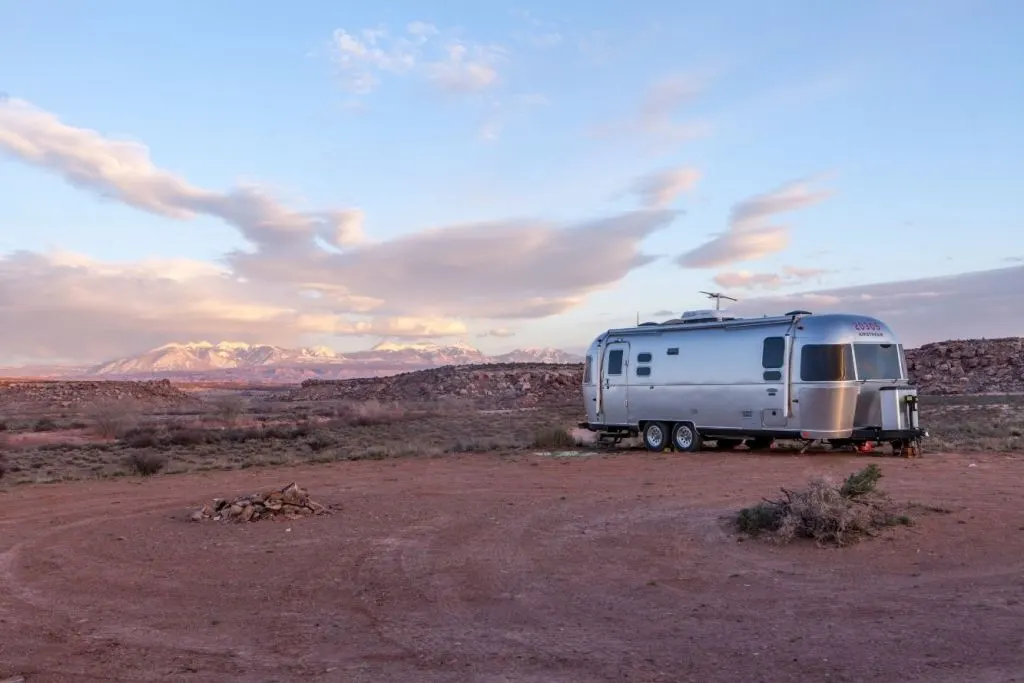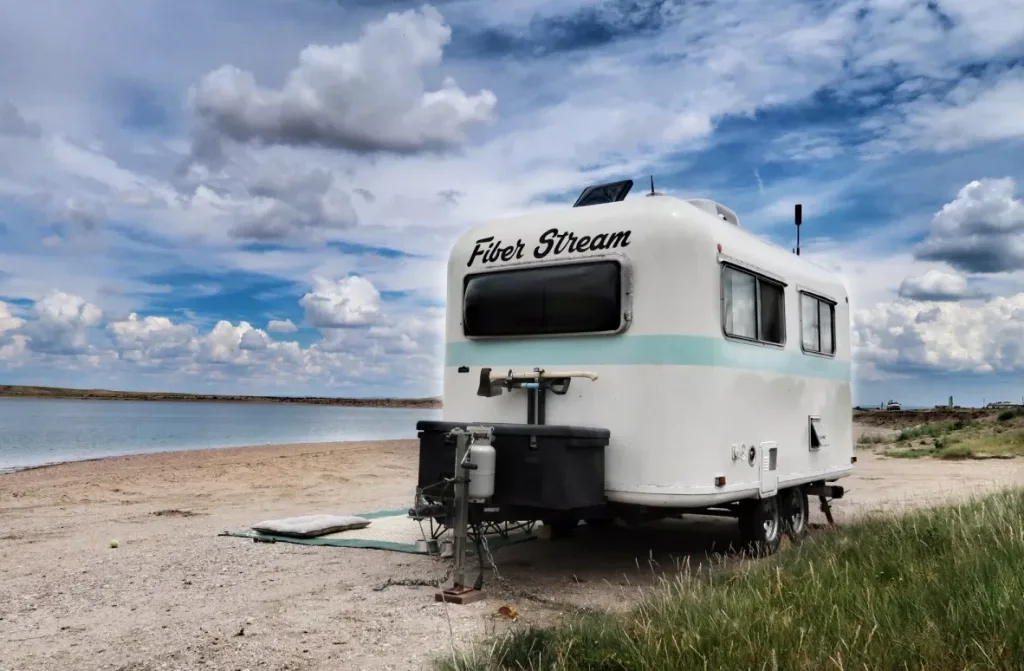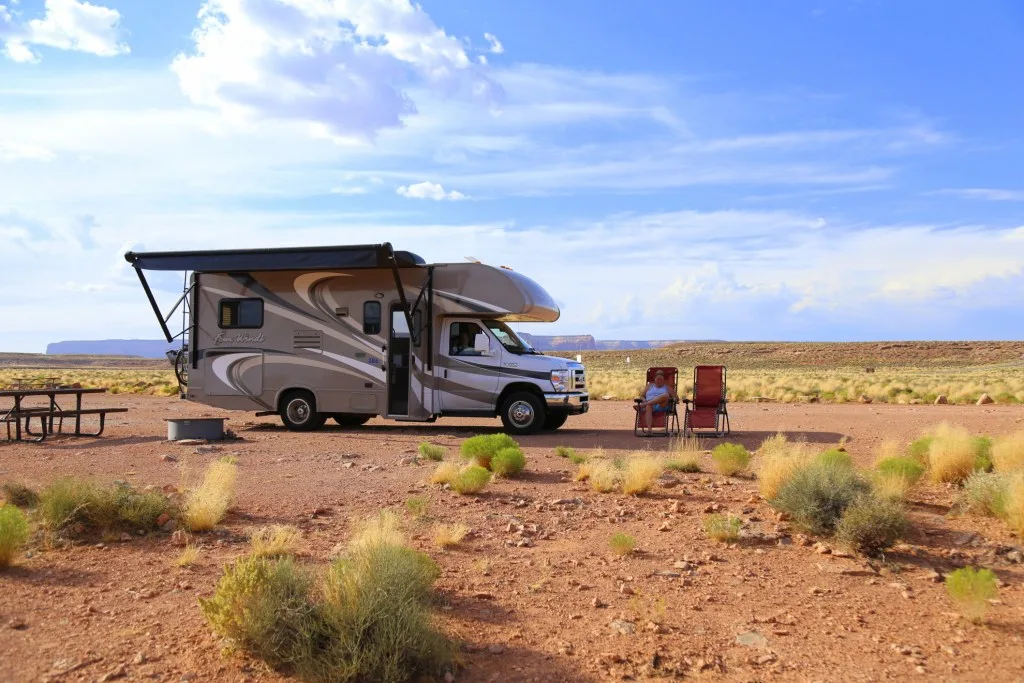No matter how long you’ve been free camping, you’re bound to make mistakes, but some mistakes are closer to sins than others.
Today, we’ll look at the seven deadly sins of free camping (aka boondocking) and how you can avoid them.
If you commit one of these sins, you’re sure to be in trouble with the law, make an enemy, or ruin boondocking for everybody.
Let’s dig in!
What Is Free Camping?
Free camping is any time you’re camping without water, sewer, or electrical hookups, and for free, obviously. It happens far from established campgrounds. RVers typically use public lands managed by federal, state, or local land agencies.
This is an excellent way to camp, especially if you enjoy privacy and connecting with nature.
Where Is Free Camping Allowed?
You may not realize it, but the United States Forestry Service and the Bureau of Land Management maintain thousands of free camping sites. Accessibility will vary from site to site; it’s never a guarantee. Road conditions can change with the weather, and larger rigs could struggle to reach many of these sites.
It’s important to scout out your site or do adequate research before attempting to boondock.
It’s also important to be alert for any signs indicating a closure. These lands can shut down for fires and other environmental conditions that create an unsafe camping situation.
If you have any questions, contact a local ranger station. They’ll likely be able to answer your question or point you in the right direction.

Why Is Sin-Free Boondocking Important?
Free-campers must obey boondocking etiquette because it ensures the longevity of boondocking sites for everyone. Free Camping etiquette means following the rules and being considerate of others.
If campers aren’t respectful, the agencies that manage the land could modify or eliminate boondocking privileges. With campgrounds becoming more crowded, we must keep as many public lands open to boondocking as possible.
7 Deadly Sins of Free Camping
The best way to ensure that public lands remain open is by avoiding these seven deadly sins. We want you to be the best boondocker you can be.

#1. Being Too Noisy
Nobody likes a loud boondocker. Whether it’s running your generator 24/7 or maxing out the volume on your music, it’s not acceptable. Free Camping is a popular camping style for those looking to escape to the wilderness.
The last thing other boondockers want to listen to is the humming of your generator or music in the middle of the night.
Be respectful of those around you, no matter how far away they may be, and keep the volume down. You would be surprised how far the sound will carry when there are no trees, bushes, or other vegetation to act as a barrier.
#2. Littering – A Sin, Free Camping or Not
One of the biggest reasons agencies shut down free camping sites is littering. To appropriately boondock, you need to leave no trace. You shouldn’t leave anything behind except your footprints.
When you’re ready to pull out of your site, double-check that you’ve gathered all of your belongings. This can help ensure you’re not leaving trash and other garbage behind for the next guest.
The agencies that manage the public lands used for free camping are often short on resources. They can’t come to clean up every mess left behind by a camper.
To maintain and protect these essential lands, everyone must do their part and clean up after themselves.
#3. Dumping Tanks on the Ground
Managing your waste tanks is essential while free camping. Some RVers struggle with this important concept more than others. However, just because you can’t figure it out doesn’t mean you should be dumping your tanks on the ground. It’s a free camping sin, whether it’s your gray water or the black.
Many local laws prohibit dumping tanks on the ground, no matter what kind of water it is.
Dumping your gray water on the ground may seem fine, but it contains food particles, soaps, and oils. These can all harm the ecosystem.
Keep in mind: Dumping grey water on the ground isn’t always illegal.
#4. Creating New Roads, Trails, or Campsites
When you’re free camping, you’re camping on public lands (most likely). It’s important not to create new roads, trails, or campsites. The purpose of these lands is to protect them and ensure that they’re available for people to enjoy in the future.
By creating new roads, trails, and campsites, you’re destroying the land and potentially damaging precious vegetation.
Only set up camp in designated campsites.
#5. Staying Too Long
It’s important to check the stay limits for the particular location where you’re camping. Some have stay limits that change based on the season.
When you observe stay limits, you ensure that more campers can use the site and that the land gets a break. Extended free camping use can destroy the land, which is one of the worst sins.
But, stay limits help give it a chance to heal.
You’ve got to know: This is a prime reason free camping sites are closing. Here’s an example.

#6. Parking Too Close to Other Campers
One of the easiest mistakes you can make, especially when starting out with boondocking, is parking too close to other campers. Many campers enjoy free camping for the privacy and open spaces.
If other boondockers wanted someone parked close to them, they’d likely have chosen an RV park.
If you’re questioning whether you’re parking too close to someone, put yourself in their shoes. Consider how you would feel if they had pulled in after you and set up their RV next to you.
If you’re expecting to use a generator, you should always increase the distance between you and others to avoid frustrating your fellow campers.
#7. Letting Your Pets Run Wild
Some free camping locations will have strict regulations regarding pets. This typically means not letting your pets run wild. Pets can interfere with the natural habitat.
We’re guests on the land, pets included, and it’s our responsibility to maintain as natural of a habitat as possible.
Having dogs and other pets running wild could disturb that.
Don’t Be a Free Camping Sinner
We love boondocking and get disappointed when we see or hear of other boondockers violating these rules. We know many land management agencies are considering closing lands.
Each time someone commits one of these sins, it gives them more reasons to shut it down. However, you can ensure you’re not a bad apple by observing these seven deadly sins of boondocking.
Have you ever committed one of these boondocking sins?
Discover the Best Free Camping Across the USA
To be honest with you, we hate paying for camping. There are so many free campsites in America (with complete privacy).
You should give it a try!
As a matter of fact, these free campsites are yours. Every time you pay federal taxes, you’re contributing to these lands.
Become a FREE CAMPING INSIDER and join the 100,000 campers who love to score the best site!
We’ll send you the 50 Best Free Campsites in the USA (one per state). Access the list by submitting your email below: